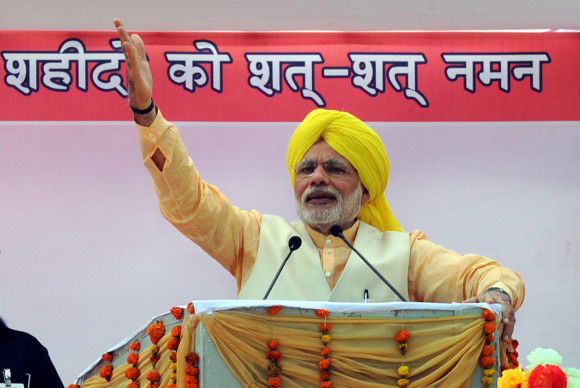Headlines
India won't discriminate on basis of religion: Modi

New York, May 7
Prime Minister Narendra Modi has declared that his government views all religions at par and won't tolerate any discrimination.
In
an extensive interview to Time magazine, the prime minister said his
and the BJP's philosophy was "Sabka saath, sabka vikas - Together with
all, progress for all.
"Wherever a (negative) view might have
been expressed (about) a minority religion, we have immediately negated
that," he said in the two-hour interview.
"So far as the
government is concerned, there is Âonly one holy book, which is the
constitution of India. The unity and the integrity of the country are
the topmost priorities.
"All religions and all communities have
the same rights, and it is my responsibility to ensure their complete
and total protection," the prime minister said.
"My government will not tolerate or accept any discrimination based on caste, creed and religion."
India will compete with China in commerce, trade: Modi
Even as it cooperates with China on the international stage, India will also compete with it in the areas of commerce and trade, Prime Minister Narendra Modi has said.The prime minister also told the Time magazine in an interview that both countries had learnt from history since their 1962 war.
"Since
nearly last three decades until this time that we have entered into the
21st century, there is by and large peace and tranquillity on the
India-China border," he said.
"It is not a volatile border. Not a
single bullet has been fired for over a quarter of a century now. This
essentially goes to prove that both countries have learnt from history."
Modi admitted that a large part of the long Sino-Indian border was still disputed.
"Still,
I think both countries have shown great maturity in the last couple of
decades to ensure and commit to economic cooperation which has continued
to grow over the last 20 to 30 years to a stage where we currently have
an extensive trade, investment and project related engagement between
the two countries.
"Given the current economic situation in the
world, we are at a stage where we cooperate with China at the
international stage but we also compete with China when it comes to
commerce and trade."
Asked to comment on China's growing
influence in the world, Modi said: "I firmly believe that there is not a
single country in the world, whether its population is one million or
much more, which would not want to increase its influence
internationally.
"I think it is a very natural tendency for the
nations to increase their influence in the international space, as they
pursue their international relations with different countries.
"I
firmly believe that with due regard to international rules and
regulations, and with full respect for human values, I think with these
two perspectives in mind each country has the right to increase its
presence, its impact and influence internationally for the benefit of
the global community."
Time magazine asked him if he would like a
special message to Chinese President Xi Jinping ahead of his trip to
Beijing this month.
"I firmly believe that the relationship
between two countries, the India-China relationship as you are referring
to, should be such that to communicate with each other there should
really not be a need for us to go through a third entity," he said.
"That is the level of relationship that we currently have."
There can be no good and bad terrorists, says Modi
In an oblique criticism of US policies, Indian Prime Minister Narendra Modi has said the world must stop distinguishing terrorists between good and bad terrorists."We should not look at terrorism from the nameplates, which group they belong to, what is their geographical location, who are the victims," Modi said in an interview to Time magazine.
"These individual groups or names will keep changing. Today you are looking at the Taliban or ISIS; tomorrow you might be looking at another name," said Modi.
Elaborating, the Indian leader, in his interview on the occasion of his completing a year in power in India after a stupendous election win, said it was important not to analyze or look at terrorism from a purely political perspective but also view it from the perspective of the way it attacks human values, as a force against humanity.
"If you view terrorism in Syria from one perspective and terrorism outside Syria from another perspective, it can create problems.
"If you view terrorism in categories such as good terrorism and bad terrorism, that too can create its own challenges. Similarly, if you view Taliban as good Taliban or bad Taliban, that creates its own problems."
Modi went on: "We should not look at these questions individually. We should address this problem in one voice, not in segmented voices something which diffuses the international focus when it comes to the problem of terrorism. I believe that this can be easily done."
The prime minister also said that the UN's Comprehensive Convention on International Terrorism should be approved.
"At least it will clearly establish whom you view as a terrorist and whom you don't. We need to delink terrorism from religion to isolate terrorists who use this interchange of arguments between terrorism and religion.
"Several countries used to see terrorism as a law-and-order situation of individual countries. We should see it as something that is a fight for human values."
He said what was needed was for countries that believe in human values to come together and fight terrorism.
"We should rather have a comprehensive look at the ideology of terrorism, see it as something that is a fight for human values, as terrorists are fighting against humanity.
Saying the names of terrorist groups will keep changing, he said: "Today you are looking at the Taliban or ISIS; tomorrow you might be looking at another name down the years.
"So it is important for the countries to go beyond the groups, beyond the individual names, beyond the geographical location they come from, beyond even looking at the victims of the terrorism, and fight terrorism as a unified force and as a collective."
He said the UN Comprehensive Convention on International Terrorism had been with the United Nations for the last several years.
"I think that could be the first step for us to take. At least it will clearly establish who you view as terrorist and who you do not view as terrorist. The definitional aspects of terrorism will get addressed."
Modi also made it clear that terrorism must be de-linked from religion, adding he had made the request to US President Barack Obama both in September last year and in January this year,
"If we are able to achieve this and if we go down this path, it would at least put an end to the emotional blackmailing which is inherent in this particular concept.
"It would also help us additionally to isolate the terrorists completely who tend to use this interchange of arguments between terrorism and religion."
Modi added: "Terrorism is a thought process. It is a thought process that is a great threat to the international community. I am also not linking it to any particular religion or to the actions of religious leaders.
"I think it is something that, as I mentioned, the countries that believe in human values need to come together and fight as a collective and not looking at individual groups from the perspective of individual religions."































